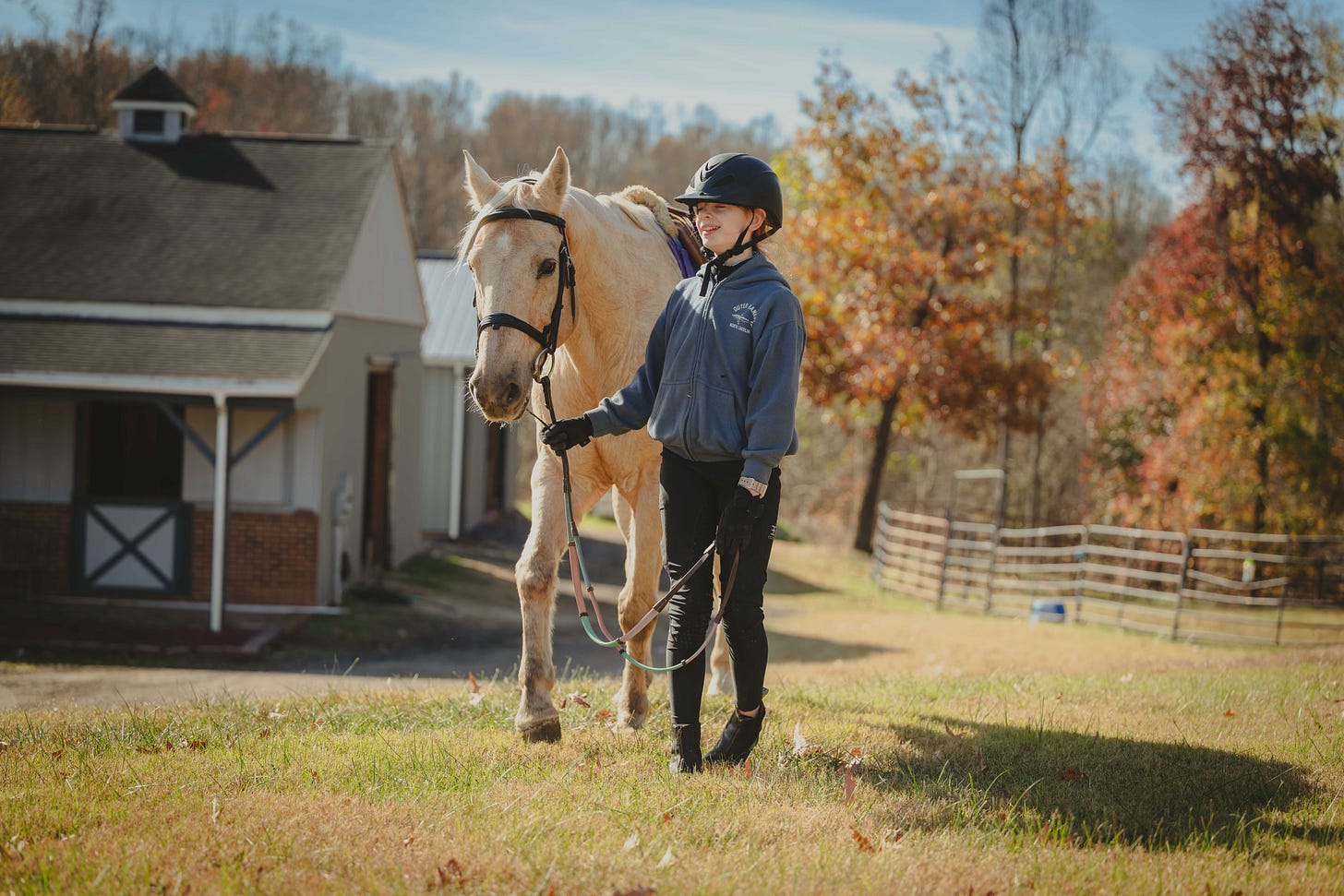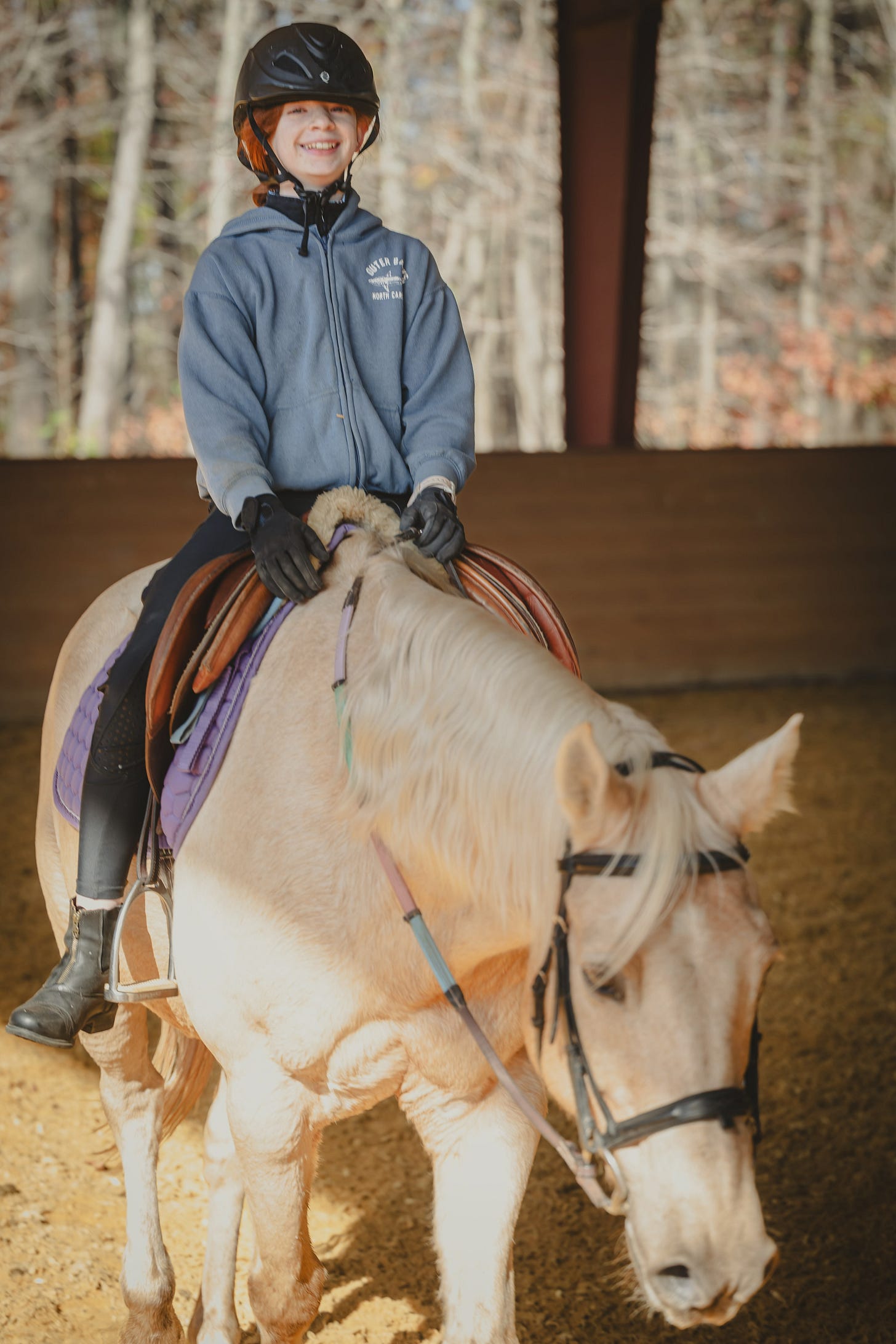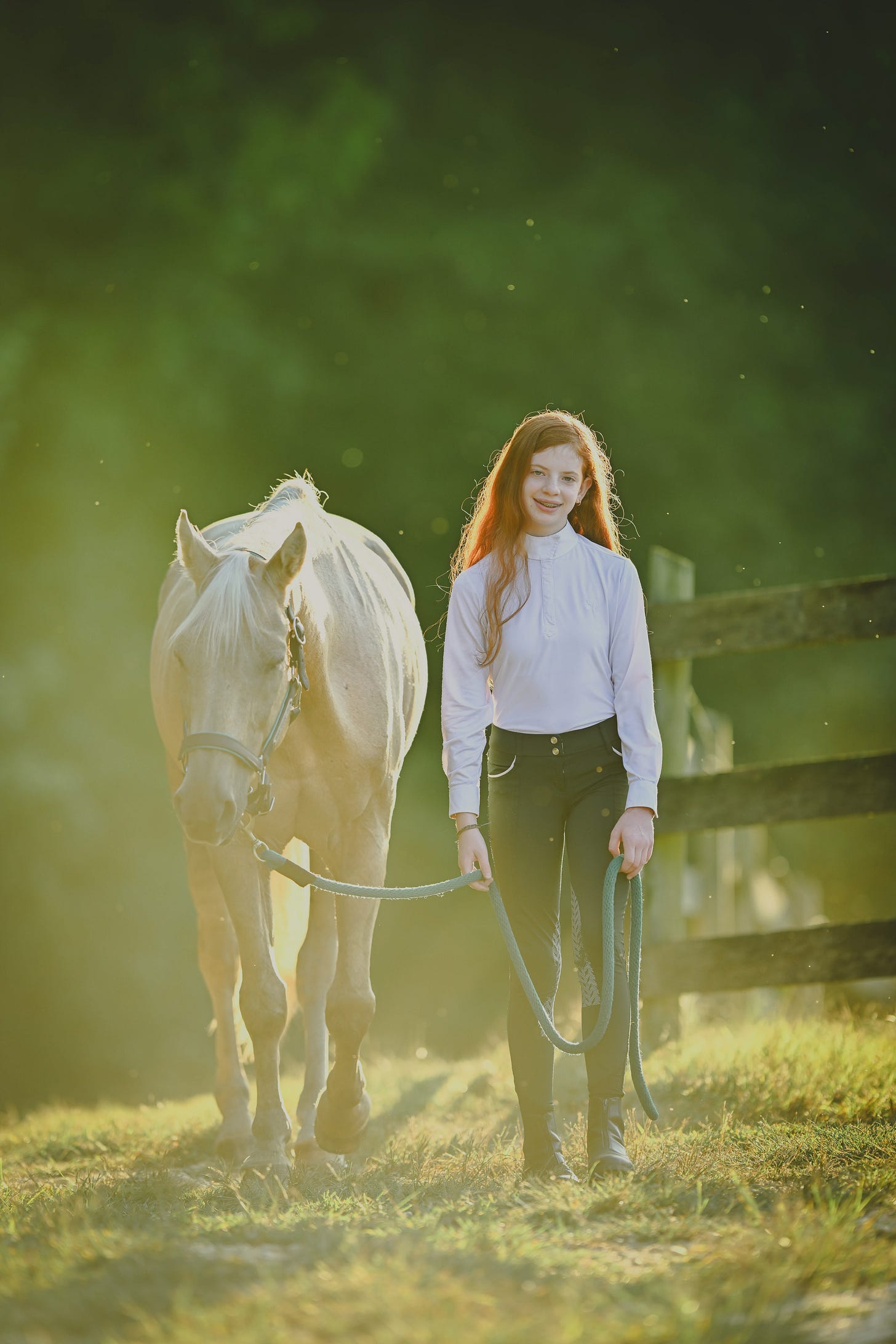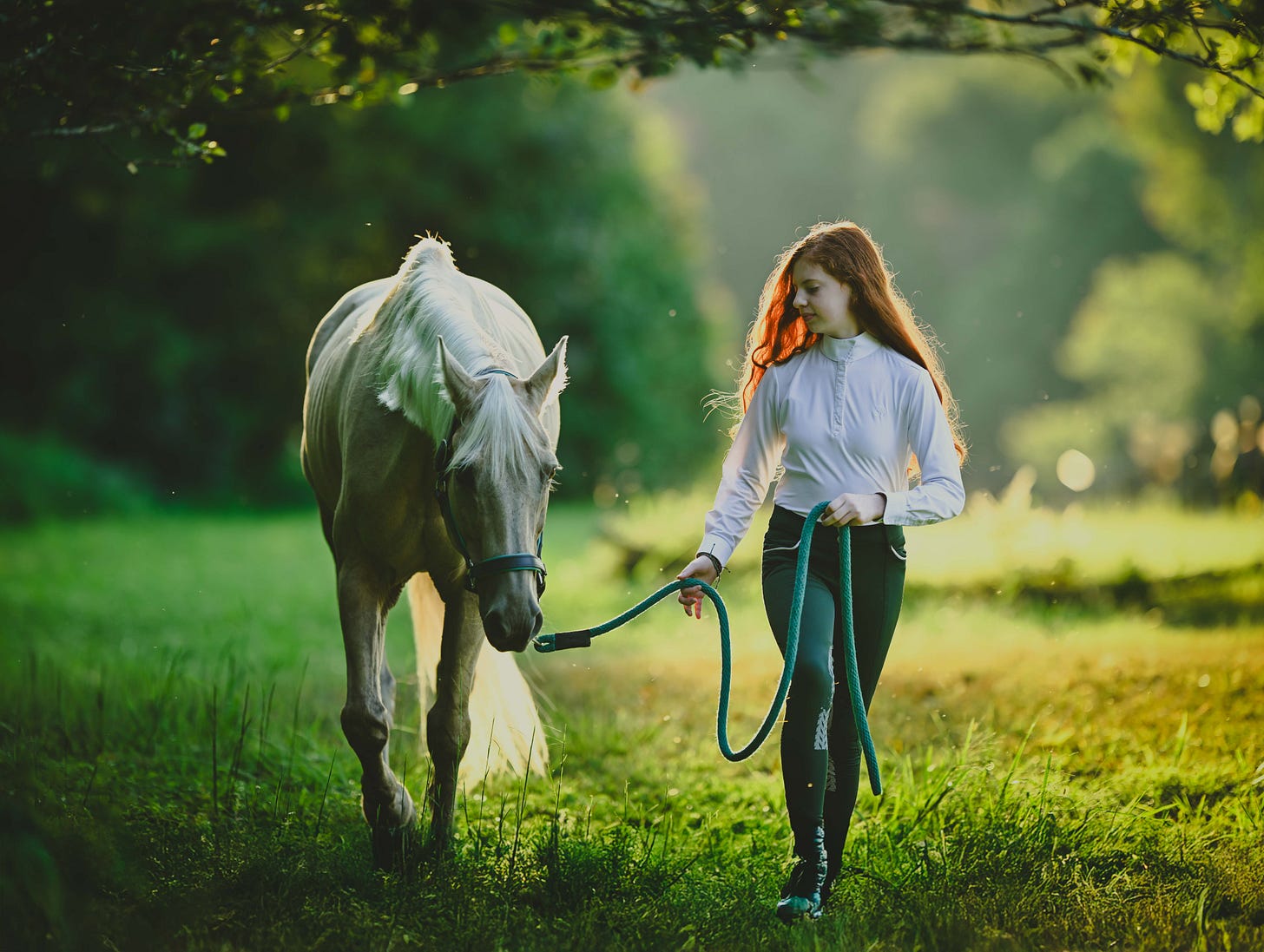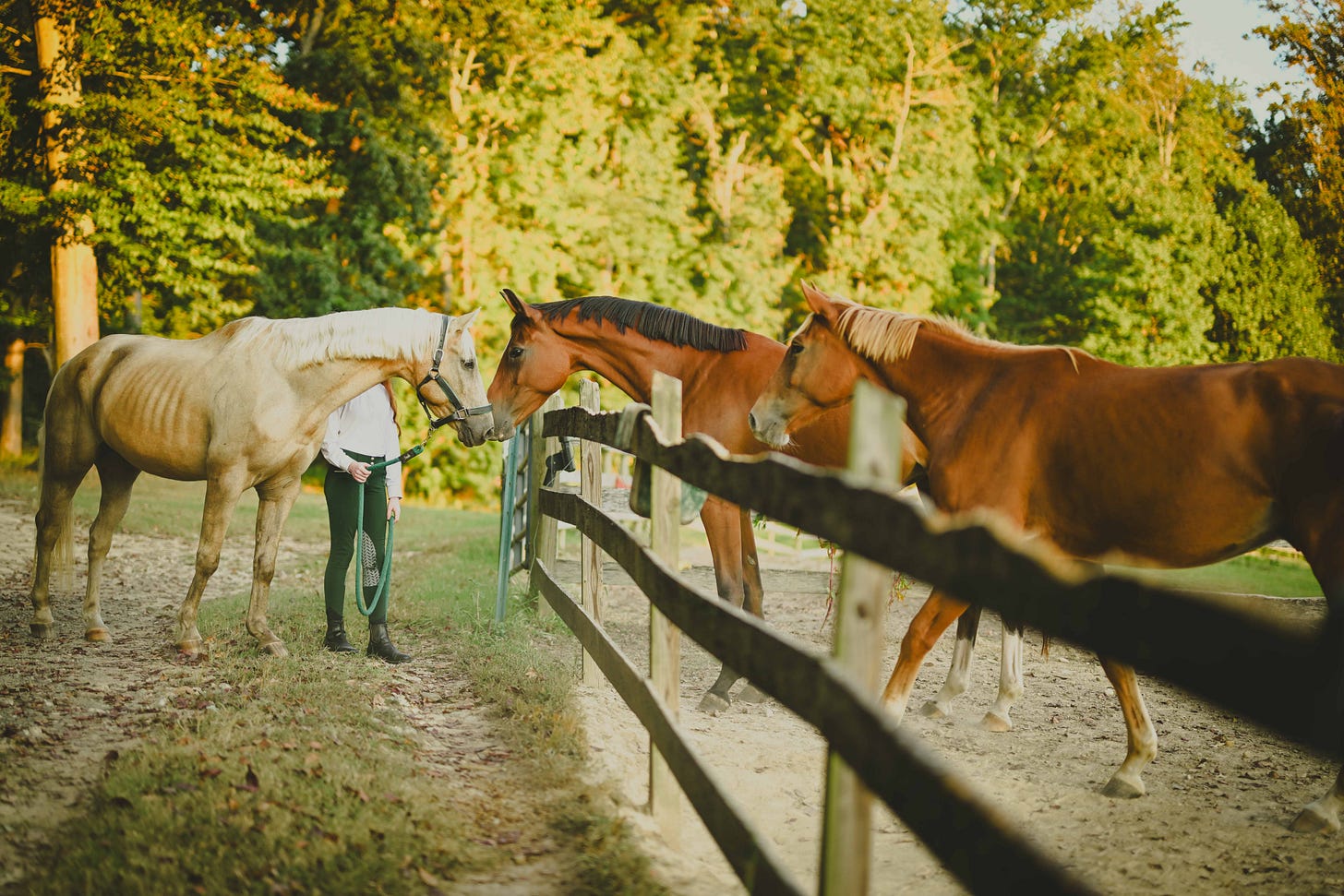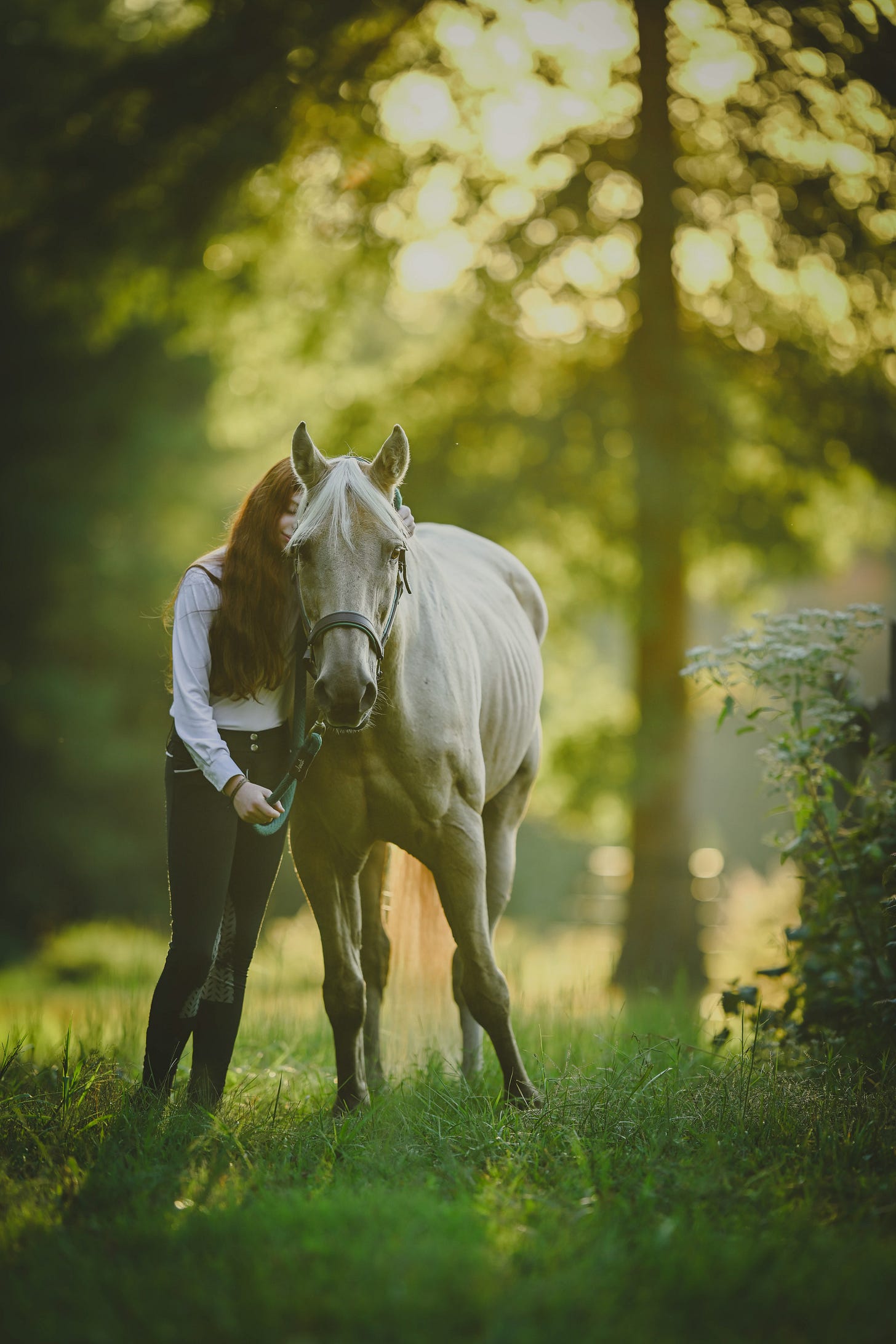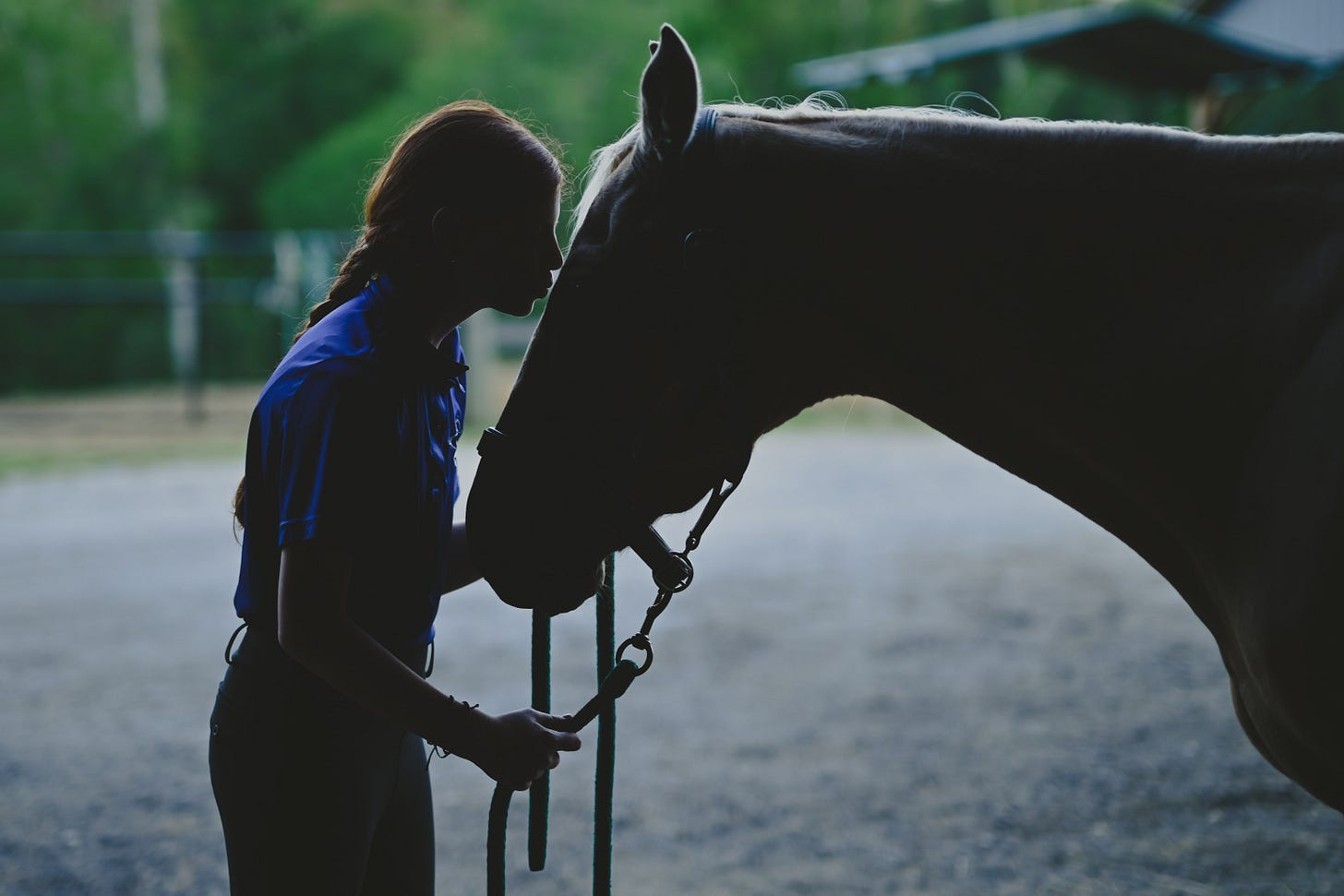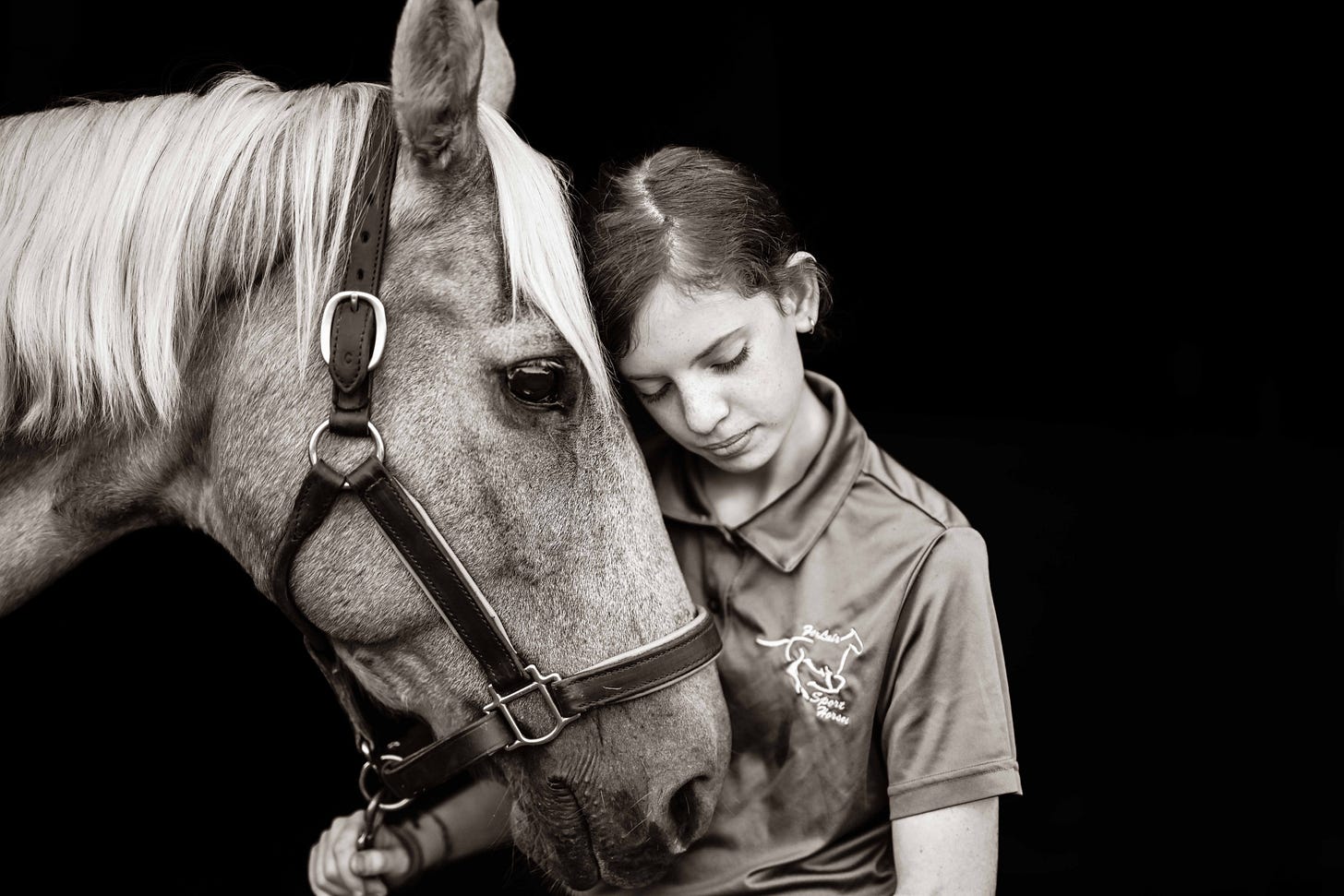It was a lazy Saturday afternoon in early September, that in-between season where summer lingers but autumn is already tugging at the edges. In our tiny neighborhood, kids wove through the streets on bikes, calling to each other as they skidded around the cul-de-sac. A thin ribbon of barbecue smoke curled from my neighbor’s deck, drifting low across our shared open lawn. I was still in shorts and a t-shirt, though I’d felt the chill that morning, the kind that hints at sweater weather pressing just around the corner.
Autumn—my favorite time of year.
After a full day of errands and chores, I was ready to settle in. Dinner was in the oven, the smell of baked chicken with zucchini and potatoes softening the air. Standing at the sink, rinsing plates, I looked out toward the forest behind my yard. The light was perfect: golden, honey-thick, laying itself gently across the lawn. The grass, freshly cut, glowed green under the late sun. In the distance, sycamore leaves had already given up, littering the ground in crisp brown. Hickory spears had turned their brilliant yellow, combs of color dangling from branches, a promise of the season to come.
The phone rang. A dear friend. They’d taken my daughter to the fair last night and I hadn’t yet thanked them. I answered with a smile in my voice.
Hey, what’s up?
But what came back was not laughter. It was sniffles and tears.
Is everything okay? I asked.
Her voice broke across the line.
It’s cancer, she said softly.
They’re putting him down next week.
The Box I Never Unpacked
I was rooting around in the attic this morning, looking for heaven knows what, and I came across a box that hadn’t been unpacked from my last move. Inside was a jumble of old coffee mugs, and assorted memorabilia from both of my grandfather’s days in the service. I always planned on hanging them in a den or office as decoration. I had carried them through several moves and never thought it worth unpacking them—because deep down I never believed I'd be here long enough for it to matter.
And standing there, in that sweaty attic this morning, I realized a pattern I had never named before.
For years I had blamed the military for my transient life—every two or three years a new address, a new community, a new start. But somewhere along the way, moving became more than an assignment; it became a habit of the heart. I learned to hold back, to never fully invest, to treat each place and each person as temporary.
It was a defense mechanism—if you don’t get too close, you don’t have to hurt when it’s time to leave.
But now, standing in my kitchen, listening to my friend’s heart break, I knew something had shifted. I had already begun to let myself belong here. I had been putting down roots for years, establishing friendships that went far deeper than the ones I typically made with fellow servicemembers. We were in each other’s lives now, our kids were growing up together. And now, one of those friends was crying on the other end of the phone line.
I opened my mouth to console my friend, reaching instinctively for words about love and loss, but stopped myself. This wasn’t the moment for philosophy or tidy comfort.
Grief doesn’t need explanations—it needs company.
So I stayed quiet and listened.
Her voice softened as she began to tell the story of a palomino-colored Quarter Horse named Jack, and how he had carried a little girl through more than just fields and trails.
How his steady gait had calmed storms no one else could reach. How, in ways only a horse can, he had changed her life forever.
The Horse That Breathed Stillness
Jack was first trained as a western sport horse, competing across the country and winning often. Around age ten, he was sold to this farm and ridden by the owners’ daughter in Polocrosse. He excelled there too, until she grew up and stopped competing.
Officially retired, the owners weren’t sure what to do with the only Quarter Horse on a farm full of elite jumpers—Westfalens, Oldenburgs, Zangersheides, Rheinlanders—bred for high-level competition.
But Jack had something rare. He was calm.
The kind of calm you’d expect from a retired Wall Street investor turned yoga instructor—ponytail, sandals, linen shirt, perfectly at peace with the world. Around him, even the sharp edges of the air seemed to soften. Nervous horses gravitated toward him, and when Jack was present, the barn grew quieter. His whole curriculum was simple: stand, breathe, be where your feet are.
So the owners kept him as a therapy horse for their anxious charges. A few years later, he found a new role—as a babysitter.
During weaning season, when foals are first separated from their mothers, Jack became the doting grandfather. His calm presence settled their nerves, and his quiet authority taught them manners no human could. Buyers won’t pay for a horse that picks fights; Jack made sure these foals grew up steady.
For the next decade, Jack enjoyed the peace of Southern Maryland, content to wander the fields in quiet contemplation, passing on his sage wisdom to prima donnas and newborns alike.
He had lived many lives in one: competitor, Polocrosse star, herd therapist, babysitter, sage. His résumé would have been eclectic—if horses kept résumés. But his true gift was always the same: he carried others, sometimes on his back, sometimes just by his presence.
By the time I met him, his palomino coat had faded to a softer gold, his stride slower, his body showing the miles. But his calm was unchanged. Horses leaned into him. People found comfort in him. He made you feel safe—like a steady hand on your shoulder saying, it’s alright, you can breathe here.
As my friend’s voice broke telling the story, I thought of the seasons again: summer turning to fall, light giving way to darkness, life giving way to death. Nothing wasted, nothing meaningless. Just one season folding into the next.
And as Jack moved from season to season, so did the people around him. Each stage seemed to prepare him for the next. And fittingly, his greatest season was still to come—brought by the most unlikely companion.
A little girl named Hope.
When Hope Found Her Wings
Hope was a gangly kid with bright red hair whose house bordered the horse farm. She would stand at the patio door, watching the horses graze or thunder across the hills in the late-afternoon haze. Over time, her parents grew acquainted with the owners, who eventually invited Hope to see a newborn foal. Her enthusiasm and curiosity impressed them, and before long she was back often.
For her 10th birthday, they let her sit atop one of the sport horses. When she asked to take the reins, they obliged—and quickly saw how naturally she listened and adjusted.
A deal was struck: in exchange for helping with farm chores, Hope would receive riding lessons.
She proved an eager student, quick to learn and unafraid of correction. When she wasn’t riding, she was still at the farm—feeding horses, doing homework by the barn, or studying riders in the arena, soaking in every instruction.
After nearly a year, she wanted more. She wanted to jump.
Jumping was another world—more complex, more dangerous, more expensive. So the owners made her a deal: if she won a blue ribbon at a local competition, she could begin training.
Hope trained relentlessly. On the day of the show, she earned her ribbon and her chance.
But almost immediately, her horse was ruled out—too far along in pregnancy to continue jumping. The owners, already charmed by Hope’s passion, didn’t want to lose her momentum. Yet no other horse was available.
And then came a seemingly absurd idea.
What about Jack?
It seemed impossible. Jack was a Quarter Horse who had never jumped, and at twenty-one he was long past his prime—like Joe Montana suiting up for one last run. But Jack had beaten the odds before, and his calm made him easy to teach.
So once again, the hardy palomino came out of retirement—this time to help a ten-year-old girl find herself.
The bond was instant.
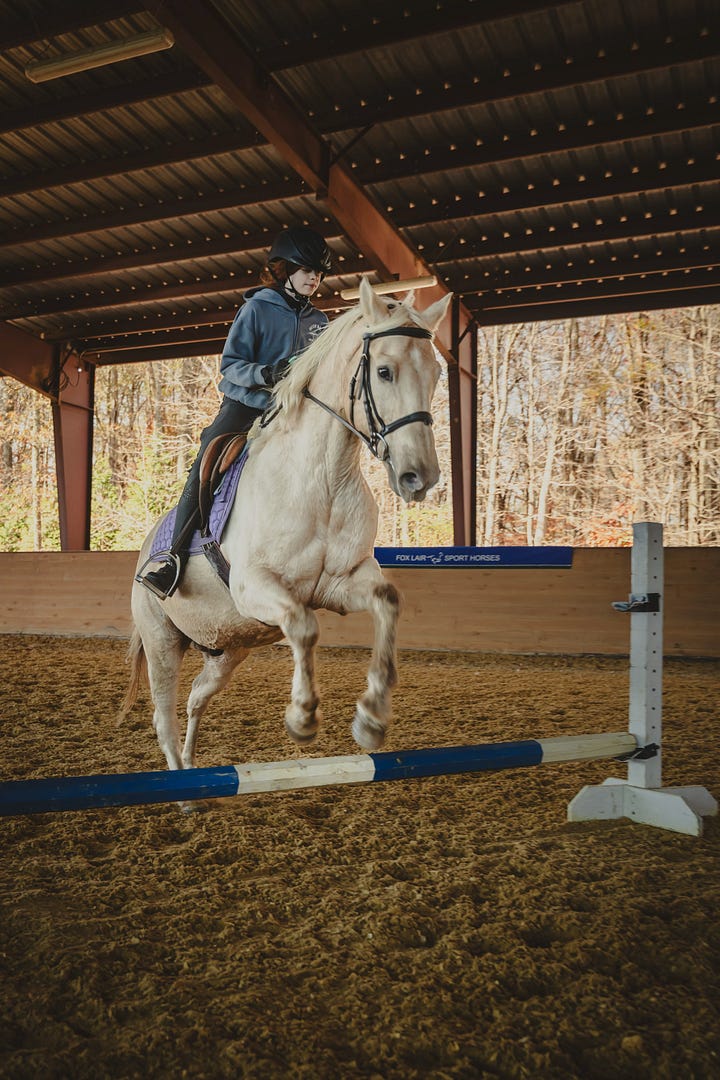
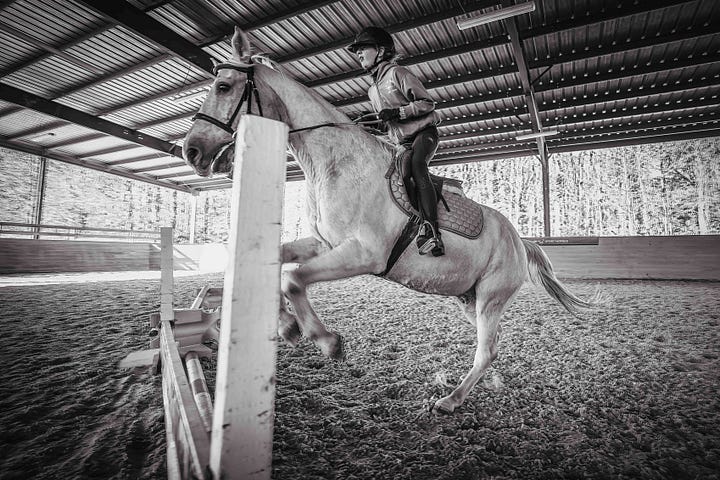
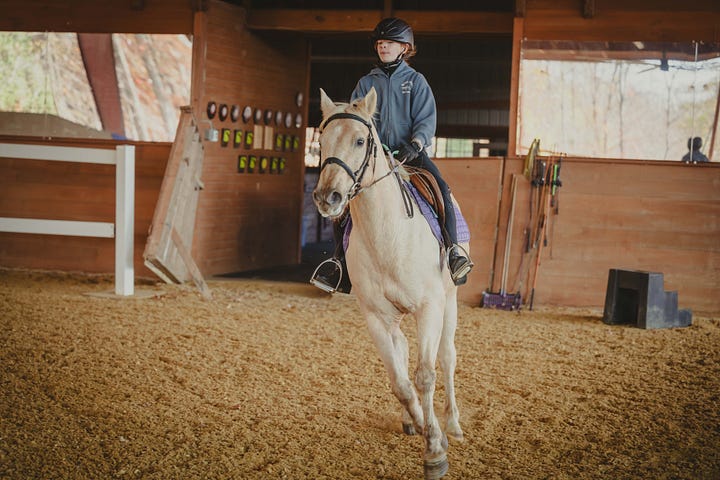
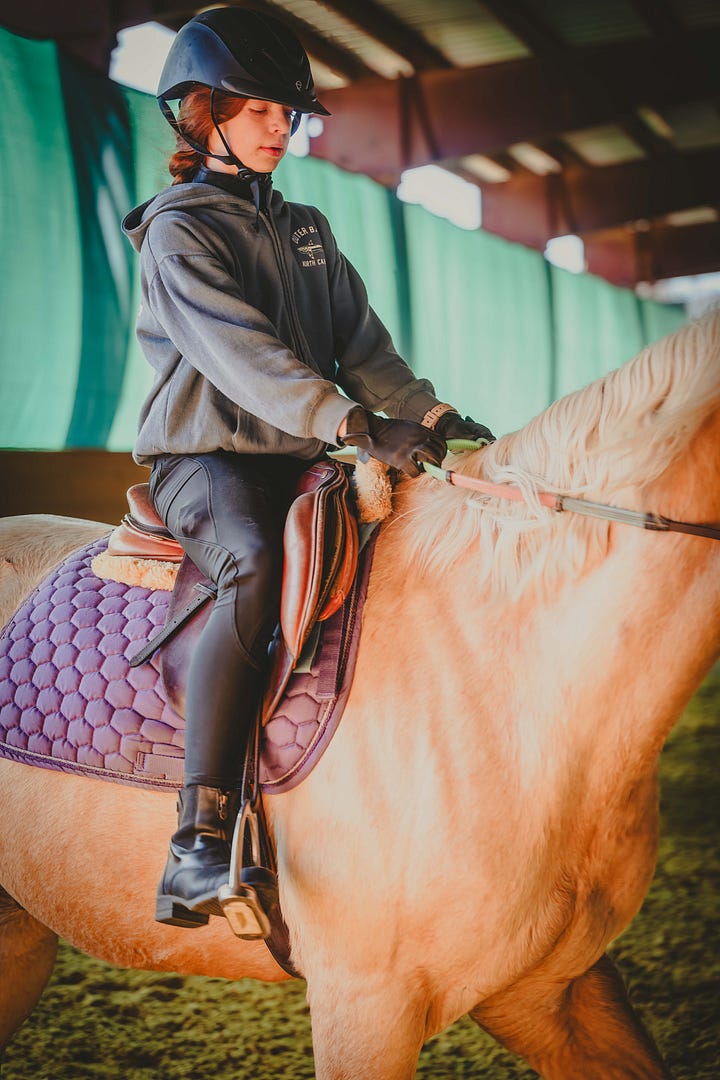
Jack listened. He respected Hope. And before long, the shy girl with braces became a confident young woman.
Jumping with Jack never felt rushed; he always listened first, moved second. With him, attention was a kind of love—total presence over every fence.
Soon the sight of Hope’s long red braid flying behind her helmet as the two soared together became a farm favorite. They fed off each other’s energy, and soon everyone knew the unlikely pair.
For three years, they were inseparable. A retired sprinter turned babysitter, and a fiery-haired girl who wanted to fly.
Together they did.
His hooves thundered, ears flicking for her voice, and when he rose over the rail, she rose with him—weightless, suspended between earth and sky.
It wasn’t supposed to work. Jack was too old, too unproven. But he and Hope wrote their own rules. He gave her confidence, and she gave him purpose. The owners put her on Jack because they trusted him to take care of her.
And he did.
By her teens, Hope was no longer the uncertain kid on the porch. She had become a rider—confident, strong, deeply attuned to the animals she loved. And Jack, with his weathered gold coat and quiet eyes, had become more than a horse.
He was her teacher. Her anchor. Her friend.
The Weight of Two Worlds
So… I hesitated. What happened?
Her mom brought me up to speed, sniffling over the phone as she hastily packed items into a bag and called instructions to her daughter across the house.
After a few years of steady work, just as conversations were beginning about how Hope might compete in serious sport jumping competitions, Hope noticed Jack was dropping weight mid-summer.
At first, they increased his grain and made sure no other horses were crowding him out at feeding time. When that didn’t help, they called in a vet. His teeth—often the culprit in weight loss—looked fine. But the vet spotted an ulcer on the back of Jack’s tongue. They flushed it with antibiotics several times a day, but Jack didn’t improve. They tried different medications, with no better result.
Hope had to stop riding Jack until his mouth healed and his weight returned.
More vets were consulted. A CT scan of his head didn’t show anything obvious, but the ulcer grew worse. He struggled to eat, dropping most of his grain in big, slimy gobs.
One day, while flushing his tongue, a large amount of necrotic tissue came out.
A biopsy confirmed the worst.
It was cancer.
That was two weeks ago.
Today is the only time we have to be with him before he’s gone, she said, her voice breaking into sobs.
How can I help? I asked, my words catching in my throat.
I had been thinking of taking photos of Jack and… her voice trailed into more sobs.
I don’t think I can do it. I’ve got to get Hope ready, and Jack needs to be groomed, and his tack is over in the far barn, and…
I’ll be right over, I said without hesitation.
Walking Towards Dusk
I looked at my watch. It was 5:05. Sunset was at 6:45.
I pulled on an old pair of jeans I wear around the farm, slid into my boots, and grabbed my camera gear. Five minutes later I was out the door.
Driving the backroads with the windows down and the sunroof open, I breathed in the smells of fall—wood smoke, blown leaves, damp earth. Kids chased each other with squirt guns in front yards. Neighbors waved. I wondered if I’d be able to keep it together. I whispered a quick prayer for guidance, for inspiration.
Then I turned through the farm’s front gate, following the winding, bumpy road until I reached the barn where Jack was housed.
Hope’s mother greeted me, her eyes red, cheeks flushed. She had just finished grooming Jack in his stall.
Hazy sunlight streamed through the wide barn doors, cutting a sharp line between golden light and shadow on the concrete floor. A gray barn cat sprawled in the beam, soaking up warmth, lifting its head to look at me with an expression of passive indifference and sublime calm.
Hope entered in her sport-jumping outfit, offering me a weary smile, unsure how she should feel about what was about to happen. I wondered how much she understood about what lay ahead, but quickly decided against trying to explain. Better to keep her in a good mood.
On the drive over, I had sketched out my plan: a long loop through the farm, stopping at favorite spots, me photographing as the sun set. After a brief discussion about the route, I turned to Hope. Her bright orange hair, freshly brushed, draped over one shoulder, nearly to her waist. Her almond-shaped eyes were wide and alert, taking everything in.
You ready? I asked, placing a hand on her shoulder.
With a quick nod, she grabbed Jack’s lead and began walking the 1,200-pound animal from the barn, as casually as if she were walking a dog.
I fell in behind as Hope led Jack down the dirt road toward the creek that split the farm along its long axis. Only then did the extent of Jack’s decline reveal itself. His ribs stood out. His skin stretched thin over bone. His face had lost its fullness. The vets had kept him comfortable with pain medication, but he was clearly diminished.
Still, to an untrained eye, Jack might have seemed healthy, eager for a sunset walk across the farm’s hills and valleys.
And for that moment, that’s exactly what it was: a girl and her horse, walking together on a beautiful late-summer evening. Just another idyllic day in what had been three extraordinary years together.
The Kiss Between Seasons
I jogged ahead of them, then turned to capture images as they walked.
Sunlight poured over the treetops, catching Hope’s red hair and Jack’s golden mane in halos of light. Gnats danced in the haze while dust from his hooves drifted into glowing clouds behind them.
All along the way she kept talking to him—telling him about her day, asking him about his. I could hear her little voice, rising and falling amidst the drone of crickets and high-pitched calls of crows in distant fields. Just two companions on a final stroll, savoring the cool air as dusk settled over the farm.
At each pasture they passed, other horses came to the fence. They walked alongside him slowly. Hope and Jack occasionally stopped, letting the horses nuzzle and sniff. It was as if the herd knew Jack was leaving, each one stepping forward to pay tribute to the years he had served as their counselor and mentor.
Walking beside him, I could feel it: an unhurried tempo that wasn’t denial but devotion. Jack’s gift wasn’t escape from time; it was fidelity to the moment entrusted to him. And now, after all those years of giving—of carrying weight not his own—it was his time to be carried. His time to rest.
Jack stood quietly through it all, in silent communion with the elegant sport horses that towered above him. He held his head high with graceful poise and quiet dignity, having attained something many of us never do:
A life spent in meaningful service to others.
The sun sank lower, washing the sky in bands of amber and rose. The air cooled and softened. Long shadows stretched across the dusty road, and the barn roofs glowed red in the last light. Cicadas droned in the trees, their chorus rising as the day gave way to evening. A faint breeze stirred the smell of hay, earth, and wood smoke. It was the kind of Southern Maryland dusk that lingered, suspended between day and night—gentle, golden, and fleeting.
When we completed the circuit, the sun had nearly disappeared. Hope’s mom and I stood just inside the barn, chatting softly, each of us doing our best not to cry. Then I glanced over and saw Hope standing with Jack in the doorway, her hands on his face, speaking to him in a quiet voice only he could hear.
I lifted my camera. Click. The frame caught her lips pressed gently to his muzzle—a kiss, a last goodbye from an old friend.
That image stayed with me long after I put my camera down.
Living Where My Feet Are
Driving home, the sky now dark, the smells of wood smoke and damp fields drifting in through the windows, I finally let myself cry.
Tears streamed down my cheeks as I thought of Jack—his grace, his calm, the way he carried so many others with dignity until the very end.
And I realized how much he had carried me, too.
For over twenty years of military service I never lived at one address longer than two years. Even now, I catch myself living like I am only here temporarily, holding back from fully investing in this place and these people. But tonight I kept thinking about Hope’s kiss, about a barn full of quiet witnesses, and about a palomino who spent his life making others steady.
This is my home. Today. Right now. These are my neighbors. Sometimes they invite me over for barbecue. Sometimes they invite me to say goodbye to a horse. Either way, they are inviting me in.
Tomorrow, I’ll unpack the box in the attic. I’ll hang the old mugs and the small service mementos and let these walls be my home.
I’m done running.
Jack reminded me to live where my feet are.
Not halfway, not guarded—present, and here to stay.



